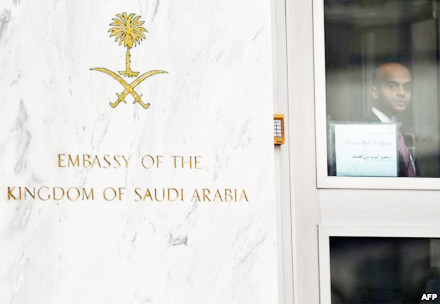
With news of an alleged Iranian plot to assassinate the Saudi ambassador in Washington, U.S.-Iran relations have reached a new low. If the allegations are true, this deplorable act should be strongly condemned. To that end, the Beltway is already buzzing with calls for a “robust response” that will “send a strong message to Iran.” But how?
As policymakers, pundits and the American people process this alleged bombshell, it is important to remember that nations have often rushed into conflicts (see: Iraq circa 2003), and we would be wise to let the investigation run its course and gather all the facts.
Indeed, the Justice Department’s accusations have been met with skepticism by some experts. Robert Baer, a former CIA case officer in the Middle East,said that the “Quds Force has never been this sloppy, using untested proxies, contracting with Mexican drug cartels, sending money through New York bank accounts, and putting its agents on U.S. soil where they risk being caught… The Quds Force is simply better than this.” Max Fisher at the Atlantic questions what Iran possibly could get out of the terror plot. And Muhammad Sahimi at Tehran Bureau about why a Quds force operative could enter U.S. soil in the first place.
There are still many details about the case that we don’t know, but this crucial point is already on theverge of irrelevance. In Washington, allowing for time to collect all the facts rarely happens. And when it comes to politically toxic issues like Iran, it almost certainly will not happen.
By sending the Attorney General of the United States, Eric Holder, to the podium to drop cataclysmic allegations, the stage has already been set. And you don’t send the Attorney General there unless you have irrefutable evidence (which was not presented at the press conference), or if you seek to leverage this as fodder for further escalation.
Despite talking a good game, neither Washington nor Tehran looks ready, willing or able to pursue sustained diplomacy. After the abandonment of diplomacy in late 2009, the Obama administration has returned to a reflexive containment policy that has the domestic political benefit of portraying the Obama White House as tough, while still falling a step short of an actual confrontation.
But containment with Iran is not a stable policy. On the contrary, it’s a policy that keeps both sides perpetually teetering on the verge of war. Containment with the Soviet Union proved to be stable for two key reasons. First, because even at the height of the Cold War, Washington and Moscow engaged in direct diplomacy — that is,effective de-escalatory mechanisms were in place. The two countries could effectively communicate with each other and sort out misunderstandings before they escalated into military conflict.
Second, it was stable because there was ample awareness on both sides that a direct confrontation between the two super powers would lead to the end of mankind. This created a natural resistance against uncontrollable escalation.
Neither of these two factors is present in the U.S.-Iran relationship. There is no direct communication between the two sides (both recently ignored or rejected each other’s proposals for direct communication). And their domestic political landscapes do not put a premium on restraint; rather, strong domestic constituencies in Washington and Tehran consistently push for escalation.
Simply put, U.S.-Iran tensions have long been a powder keg, overflowing with nuclear programs, human rights abuses, Stuxnet and secret assassinations. And the alleged terror plot against the Saudi Ambassador shows how easily a single incident can spark a wider conflict. Without serious efforts to defuse a crisis that is steadily spiraling out of control, we are on the precipice of a major war in the region.
This is why a containment policy can turn into a self-fulfilling prophecy. Short of a government collapse in Tehran or strategic shift in Washington — both unlikely in the short tomedium term — containment has created an environment in which adversaries repeatedly provoke one another, without having the ability to reverse any escalation.
The Obama administration must avoid falling further into this trap — particularly if there are Iranian hardliners trying to bait the U.S. into a conflict.
In 2008, a war with Iran was considered devastating to U.S. interests. This outcome is no less disastrous today for an America with 9% unemployment, and still on the brink of economic catastrophe.
Hawks in Washington will use these new allegations to support their preconceived notions on why defusing the Iran crisis cannot be done — the timing isn’t right; we need to garner more leverage by escalating the pressure; this regime needs enmity with America for its survival and so forth. Ironically, their counterparts in Tehran will echo similar sentiments.
This is what we call a real “come to Jesus” moment — some hard decisions on war and peace need to be made, in Washington and Tehran. Unfortunately, given the history and politics involved, all signs are pointing in the wrong direction. It is often forgotten that in crises like this, it takes greater courage to stand for restraint and de-escalation than to opt for war and confrontation.
First publish in HuffingtonPost.com.
AUTHORS
Reza Marashi joined NIAC in 2010 as the organization’s first Research Director. He came to NIAC after four years in the Office of Iranian Affairs at the U.S. Department of State.
Trita Parsi is President of the National Iranian American Council and author of A Single Roll of the Dice – Obama’s Diplomacy with Iran (Yale University Press, 2012).






